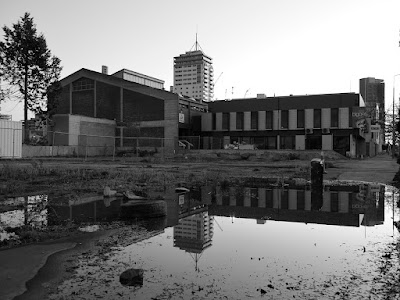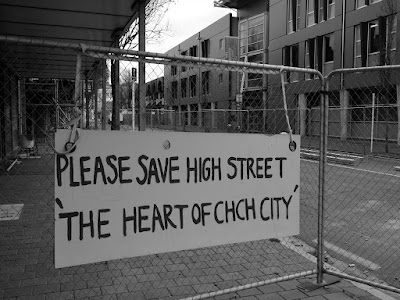Picture the scene, you're in the middle of a city and it looks something out of an apocalypse film, empty derelict buildings, boarded up houses, barracades and warning signs everywhere. This is pretty much how central Christchurch looks 18 months on since the 6.3 magnitude earthquake which devastated the city on 22
nd February 2011.
 |
| A poignant memorial by the Oxford Terrace Baptist Church |
Punting down the River Avon used to be one of the main tourist attractions, now, it's touring the borders of the red zone - these are the areas of the city which are off limit as they're too dangerous to walk through. There's a morbid curiousity which draws people to see how little has changed since the earthquake, which claimed 185 lives. Some people were even cruising around the red zone from the comfort of their cars where possible which makes the situation even more bizarre - more recently it was announced that
CERA (the Canterbury Earthquake Recovery Authority) were running
bus tours through the red zone. It might seem hypocritical that we did our own tour round the infamous red zone but it was more of a way of reacquainting ourselves with the city we saw when we first arrived in New Zealand 5 years ago and seeing what remained of the Christchurch we used to know. Some of the photos that I took on our first trip can be viewed
here.
 |
| Christchurch CDB red zone taken from the Rebuild Christchurch website |
It wasn't surprising that we hardly recognised where we were, empty plots of land lie where buildings used to be, certain main roads are fenced off and it's hard to tell what is earthquake damage and what is general reconstruction. More than half of the earthquake’s death toll (across 20 nationalities) occurred in the poorly constructed Canterbury TV building. Even the hostel we originally stayed at on Gloucester Street (
Stonehurst Accommodation), no longer exists as it was too badly damaged to be salvaged.
 |
| The defunct Stonehurst Accomodation - source telegraph.co.uk |
The worst affected area of the Central Business District is down by Cathdral Square which has been completely devestated. The once magnificent catherdral that stood on the square is now a shadow of it's former self. I have memories of taking photos on the Square whilst watching the "Wizard of Christchurch" giving a speech to a crowd of visitors, as a chess player pondered his next move whilst a vintage tram passed by. Christchurch is a very different place today, not quite the "vibrant city in transition" that the tourism collateral portrays it to be - sorry
Lonely Planet but this just isn't the case.
 |
| The front of the cathedral where the spire used to stand and The Chalice |
 |
| Aftershocks degraded the building before the Rose Window could be saved |
 |
| The Citizen's War Memorial in front of the Cathedral |
It's not all doom and gloom though, as there are signs of regeneration, but at a slow pace. Maybe it's because of the current economic climate, down to bureaucracy or even waiting for all the seismic activity to settle (apparently there have been some big aftershocks since the earthquake) but it's getting in the way of decisions about what to do with the rebuilding the city. We saw some graffiti down by the High Street showing the general disatisfaction at how long its taking to deal with the damaged buidlings and get back to a sense of normality. It has been estimated that the earthquake is the third most expensive natural disaster in history, potentially costing over $20 billion NZD to rebuild the city, which gives you a bit of perspective as to how big the task at hand is.
In terms of the cathedral, the last I heard was that it had been deconsecrated on 9
th November 2011 and that it will eventually be pulled down, however, another one won't be rebuilt in it's place. This caused a lot of public outcry and opposition from groups such as the UNESCO World Heritage Centre calling for the landmark cathedral to be saved as it would testify to history and continuity of cultural life, that a brand new building wouldn't be able to convey.
Down by Cashel Street, near the Bridge of Remeberamce is a temporary "pop up village" called
Re:START, which is next to where the old shopping precinct used to be. Opened at the end of October 2011, it's a novel idea as all the 29 retail units are based in vibrant colourful shipping containers designed to bring commercial life back to the CBD.
 |
| The Bridge of Remembrance at the end of the Cashel Mall |
 |
| Cashel Street looking back towards the Bridge of Remembrance |
 |
| The precinct includes a variety of retailers to boost the local economy |
 |
| There's plenty of outdoor space to enjoy a coffee at one of the cafés |
 |
| The earthquake devastated end of Cashel Street in the red zone |
Hawke's Bay and Christchurch both share both share a common and tragic bond, however, if any lessons from the
1931 Hawke's Bay earthquake can be learnt, the rebuilding of Napier and Hastings presented unique opportunities for the replacement of the city centres. Architectural practices in Napier collaborated to share resources and ideas to design some of the most striking Art Deco and Spanish Mission style buildings of the time, in an era of economic depression where few insurance policies covered earthquakes. Truth be told, Christchurch wasn't really a city that appealed to my interests before the earthquake, but having seen what it is like now I feel a great sense of loss especially as it will be a long time before we see the new Christchurch, maybe even
decades...
 |
| To the left, the Gothic Revival Trinity Church minus the collapsed tower |
 |
| The relatively unscathed Spanish Mission façades of New Regent Street |
 |
| The cordoned off area between Oxford Terrace and Hereford St |
 |
| Michael Parekowhai's bronze bull at a vacant plot on Madras Street |
 |
| It's odd which buildings survived but generally the older ones fared better |
 |
| The remains of the Durham Street Methodist Mission offices |
 |
| A residential building which is clearly sinking on its foundations |
 |
| Yellow placard declaring this home unsafe amongst hundreds of others |
On a more positive note, the main reason why we came to Christchurch was to see the Crusaders play the Hurricanes in their new home ground, the
AMI Stadium in Addington, for the very first time. Lancaster Park, the original home ground of the Crusaders was badly damaged in the February 2011 earthquake and as a result all the games scheduled in Christchurch for the Rugby World Cup had to be relocated. The match was also a special occasion for the Hurricanes as it was the first time they played in Christchurch since 2009. Last year the teams only played one of their two scheduled matches, after the February earthquake caused the first game to be cancelled and declared a draw. For us this will be the second time we've seen the Crusaders play in New Zealand as we saw them play the Chiefs at
McLean Park in Napier for their first "home" game of the season.
 |
| As part of the pre-match building up a horseman circles the field whipping up the crowd! |
 |
| More "knights" on horseback coming out to Conquest of Paradise by Greek composer, Vangelis |
 |
| Us with our free foam swords! |
 |
| View from the West Stand |
It was a close game but the Hurricanes just edged the match on a penalty and won 23-22. We were absolutely freezing sitting in the open air West Stand for 80 minutes as the temperature dropped to
-3oC!












































No comments:
Post a Comment